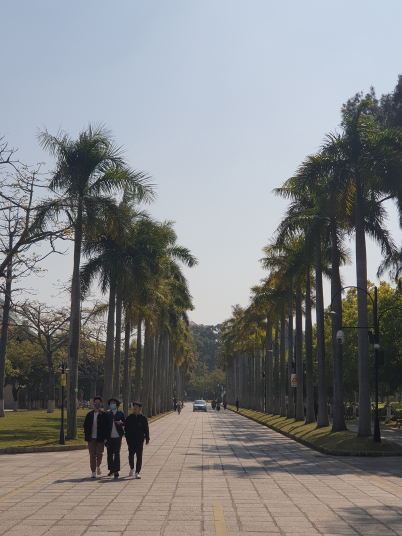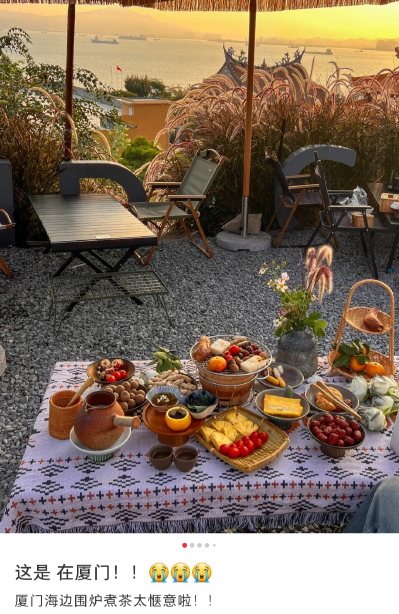
With sprawling views of lush green gardens and the distant glistening of sunlight dancing on the harbor's deep waters, Xiamen University, located in the eponymous city in the southeastern province of Fujian, possesses what is arguably one of the most beautiful college campuses in all of China. Crisscrossing the site, if you squint—and give your imagination full rein—you just might be able to envisage yourself sauntering along Hollywood's Sunset Boulevard.
Marnix Groot, a Dutch airport development expert, who spent almost a decade living and working in China—and who is also a dear friend of this author—studied at the renowned institution in 2003 and reminisces fondly of his time spent there.
"Mind you, this was 2003. China wasn't exactly 'in the picture' the way it is today," Groot told Beijing Review. "Till then, my travels had always taken me across the Atlantic; I had not yet set foot in Asia. So when I got the opportunity to go study in China, my first choice was to go to Beijing. But as that spot had already been scooped up, I opted for the next (and only) one on offer: Xiamen University—or Xia Da. Foreigners were, as was to be expected, few and far between there. When I first landed, I couldn't even pronounce the word 'Xiamen'," Groot added, laughing.
Twenty years have gone by since the Dutch airport aficionado set out on his first China voyage and times have certainly changed in Xiamen—and in China as a whole. But some things have stayed the same: The city still bursts with color and verve by day, its high-rises light up the urban nightscape and its picturesque traditions are woven through the old port at all times.

Salon talk
This brings us back to Xia Da. On February 26, this particular beacon of education and tradition served as the home to a salon centered on youth power in the process of modernization. The meeting was part of the Global Young Leaders Dialogue (GYLD) China Tour—Xiamen. The GYLD is a program that regularly takes international participants on tours of different regions across China to offer them the chance to gain a more in-depth understanding of the country.
This time around, a group of international youth from eight countries visited the tropical port city from February 25 to 27.
"Young power can light a fire within society and lend it an increased sense of open-mindedness, which in turn will lead to innovation and thus modernization," Yu Yunquan, President of the Academy of Contemporary China and World Studies, an affiliate of China International Communications Group, said in his opening address at the meeting. Liu Yue, Vice Dean of the Foreign Languages School at Xiamen University, chimed in with a more specific example of cultural connection, delving into the topic of tea.
"Tea has enabled us to sip across continents and eras for almost two centuries, ever since Xiamen Port first welcomed international traders in the early 19th century," Liu said, adding, "The English word 'tea' itself is actually a transliteration of the word in a southern Chinese dialect. Tea is just one example of how cultural and youth exchanges and intercultural communication have had a great effect on global development historically."
At the heart of Xiamen's extensive and well-documented tea culture, you will find gongfu tea, which is actually not a tea blend but a ritual for brewing tea leaves.
And so, taking a leaf out of Liu's book, this author, who usually looks at China through the lens of fashion and urban culture, wants to elaborate a little on the topic of tea, pouring in the element of China's new youth and their latest lifestyle pursuits.
Spilling the tea
Today, stove-boiled tea (or weiluzhucha in Chinese) is one of the latest slow-living trends among young Chinese. The reason it has been gaining such popularity, apart from its embodiment of traditional Chinese tea culture, is that the activity is in line with young people's pursuit of a sense of ritual and reflects their aspirations to return to a more laidback, natural, sustainable lifestyle.
As the name suggests, the activity refers to lightly roasting tea leaves before boiling them in a pot on a charcoal-filled stove.
Brewing one's own tea is commonly seen as something people aged 50 and above do in China, whereas younger generations prefer bubble tea or coffee. The weiluzhucha trend, which first gained traction on Chinese social media late last year, represents the revival of Chinese tea culture among Chinese youngsters yearning to slow down the hectic pace of their everyday (urban) lives.
Lifestyle app Xiaohongshu (Little Red Book) had featured over 790,000 notes on the topic as of March 8, as well as over 19,000 related products, like the actual small stove, for sale. The tag "Enjoying stove-boiled tea in Xiamen" accounted for tens of thousands of the notes.
And as one of the birthplaces of gongfu tea, Xiamen serves up the perfect blend of quintessential tea culture and coastal chill. Recent months have seen more and more young travelers flocking to the old port, eager to indulge in its many delights, including seaside stove-boiled tea parties, after China lifted its domestic travel restrictions in late 2022.
It's hot, it's cool
Xiamen's youthful prowess doesn't end with a cuppa. The city has been a key import and export hub since the 1500s and became even more vital following its designation as one of China's first four special economic zones in 1980. For good measure: A special economic zone is an area of China with economic policies that aim to attract foreign investment.
Since the early 2010s, slowly transforming into an enclave mixing urban energy and laid-back vibes, the city began emerging as a magnet for bon ton travelers and art devotees alike, with many young creatives looking to leave behind the chaos and competition of, let's say, Shanghai and Beijing in favor of a breezier, coastal lifestyle. In 2017, CNN even hailed Xiamen as China's "new capital of cool."
Its laid-back rhythm gives, for example, young fashion designers a more relaxed environment to build their work at their own pace, facing less pressure and competition than they would in a larger metropolis.
Top designers like Sankuanz, known for his eccentric and extravagant art approach to design, or cutting-edge brands like deepmoss, the embodiment of a rational yet romantic aesthetic, decided to set up shop in the city years ago.
The local government, too, has demonstrated a passion for fashion and has been issuing fashion-forward initiatives over the past decade, including reduced studio and operational costs. Xiamen's proximity to the country's southern textile belt also doesn't hurt when you're in the business of dressing people.
Nor does having a lively contemporary arts scene right next door, i.e., the Shapowei Art Zone, a historical shelter wharf. Beginning its transformation into an area filled with artist studios, a skate park and boutiques in the mid-2010s, it sits at the heart of local youth culture, with a sense of old and new clashing to perfection.
So what does a typical afternoon at Shapowei look like? Watching the skaters perform their tricks, wandering along the wharf and popping into a few art studios and handcraft workshops. Or you can just sit outside and take in the harbor views in the company of a pour-over coffee or a craft beer. Or a cup of stove-boiled tea—served with an air of coastal cool.
(Print Edition Title: An Air of Coastal Cool)
Copyedited by G.P. Wilson
Comments to elsbeth@cicgamericas.com